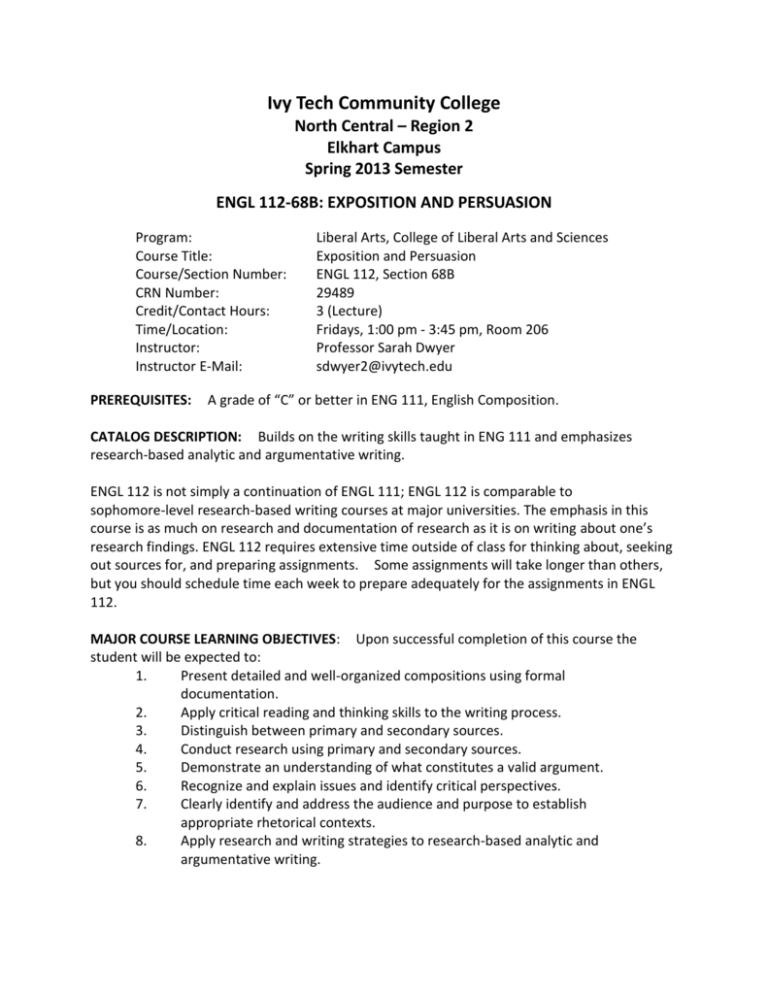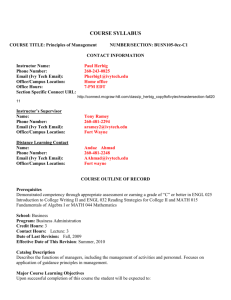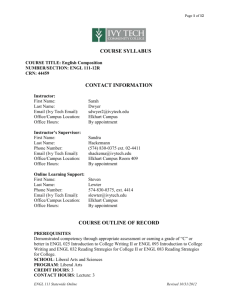
Ivy Tech Community College
North Central – Region 2
Elkhart Campus
Spring 2013 Semester
ENGL 112-68B: EXPOSITION AND PERSUASION
Program:
Course Title:
Course/Section Number:
CRN Number:
Credit/Contact Hours:
Time/Location:
Instructor:
Instructor E-Mail:
PREREQUISITES:
Liberal Arts, College of Liberal Arts and Sciences
Exposition and Persuasion
ENGL 112, Section 68B
29489
3 (Lecture)
Fridays, 1:00 pm - 3:45 pm, Room 206
Professor Sarah Dwyer
sdwyer2@ivytech.edu
A grade of “C” or better in ENG 111, English Composition.
CATALOG DESCRIPTION: Builds on the writing skills taught in ENG 111 and emphasizes
research-based analytic and argumentative writing.
ENGL 112 is not simply a continuation of ENGL 111; ENGL 112 is comparable to
sophomore-level research-based writing courses at major universities. The emphasis in this
course is as much on research and documentation of research as it is on writing about one’s
research findings. ENGL 112 requires extensive time outside of class for thinking about, seeking
out sources for, and preparing assignments. Some assignments will take longer than others,
but you should schedule time each week to prepare adequately for the assignments in ENGL
112.
MAJOR COURSE LEARNING OBJECTIVES: Upon successful completion of this course the
student will be expected to:
1.
Present detailed and well-organized compositions using formal
documentation.
2.
Apply critical reading and thinking skills to the writing process.
3.
Distinguish between primary and secondary sources.
4.
Conduct research using primary and secondary sources.
5.
Demonstrate an understanding of what constitutes a valid argument.
6.
Recognize and explain issues and identify critical perspectives.
7.
Clearly identify and address the audience and purpose to establish
appropriate rhetorical contexts.
8.
Apply research and writing strategies to research-based analytic and
argumentative writing.
COURSE CONTENT (COR): Topical areas of study will include:
Primary research
Audience identification
Secondary research
Critical reading and thinking
Argumentation
Critical perspectives
Systems of logic
Library and electronic research methods
Documentation (APA)
Style
Rhetoric
METHODS OF EVALUATION (COR): Students will write for evaluation at least five
compositions and an essay exam. Students will write a minimum of 5,000 words, excluding
rough drafts, during the semester. At least two compositions must include analysis,
argumentation, proposals, and annotated bibliographies. Instructors will require that in at
least one paper students will incorporate outside sources into their writing and use an
appropriate style of documentation.
METHODS OF EVALUATION (REGIONAL):
Class Discussion/Participation
Critical Analysis
Exercises and Writing
Researched Position Paper
Blackboard Discussion Board
Annotated/Working Bibliography
Literature Review
Research Proposal
METHODS OF INSTRUCTIONAL DELIVERY: Lecture, computer, Internet, class discussion,
one-on-one feedback, online course platform, e-mail
REQUIRED TEXT: Wood, Nancy. Perspectives on Argument. 6th ed. Upper Saddle River, NJ:
Pearson/Prentice Hall. 2007. ISBN-13: 9780205704064 [Please note that new editions come
bundled with MyCompLab, but used editions do not. We will not be using MyCompLab this
semester.]
REQUIRED RESOURCES: Personal responsibility and ability to understand and use a variety of
computer programs and applications, including saving files in Rich Text Format. Regular,
reliable access to a computer with an Internet connection and word processing software
(Microsoft Word is recommended).
RECOMMENDED ITEMS and MATERIALS: A flash drive for saving copies of your work. Any
reference guide for college-level writing. A current collegiate level dictionary and a notebook
and writing utensil for note-taking and in-class activities.
GRADING GUIDELINES FOR ESSAYS AND PAPERS (INSTRUCTOR): Each type of writing done in
the course will have its own rubric for purposes of evaluation and grading. As a point of
reference for formal papers, the following six-category rubric may help writers focus on
minimum collegiate and professional expectations.
The six criteria of the rubric:
1. Purpose/Focus/Clarity. The writing must present a main point or a clear purpose,
with a clear sense of audience and a focused presentation.
2. Organization/Coherence. The writing must be organized into a reasonable, logical
progression of idea(s).
3. Correctness/Writing Conventions. The writing must give the reader neither
difficulty in determining the intended meaning nor distraction from grammar errors
(sentence structure, agreement, word choice), mechanics errors (spelling,
punctuation), or manuscript preparation errors (formatting).
4. Style. The writer must maintain a consistent and appropriate voice (diction) and
tone (emotional attitude) toward both subject and audience.
5. Critical Thinking. The writer must analyze the available data and must clearly
convey that analysis in the writing
6. References. When using source material, the writer must incorporate sources
correctly, integrating them appropriately into the flow of ideas and tracking them
consistently from text citations to the source list at the end of the text.
Assignments:
Basic APA format is required for all assignments. Assignments are due according to the
activities schedule. Late work will only be accepted if you contact the instructor ahead of time
to make alternate arrangements for the completion of the work.
Discussion Board Postings:
The Discussion Board will hold a forum for skill building and knowledge sharing about posted
topics. The topics will be listed by the instructor for each period. It is the student’s responsibility
to maintain a presence on the Discussion Boards in a timely manner. Discussion Board posts
must be completed by the start of class on the day that they are due. This means that posts
with a timestamp of 12:59 p.m. will be accepted, but posts with a timestamp of 1:01 p.m. will
not be.
Each week there will be an assignment to complete on the Discussion Board. Students are to
complete the assignment in at least 200 words, and are encouraged to provide one another
with commentary about each other's posts as the topics allow.
GRADING SCALE:
90-100%
80-89%
70-79%
60-69%
Below 60%
=
=
=
=
=
A
B
C
D
F
=
=
=
=
=
765-850 points
680-764 points
595-679 points
510-594 points
509 points and below
The total possible point value of each Assignment is represented below:
E-mail Acknowledgement
=10 points
Position Paper Topics
=20 points
Research Proposal Exercise
=15 points
APA Exercise
=20 points
Research Proposal
=30 points
Critical Analysis Exercise
=15 points
Critical Analysis #1
=30 points
Literature Review Exercise
=15 points
Research Literature Review
=60 points
Annotated Bibliography Exercise
=30 points
Annotated Bibliography
=60 points
Position Paper Outline
=30 points
Critical Analysis #2
=30 points
Rough Draft of Position Paper
=20 points
Peer Reviews (2)
=15 points each (30 total)
Position Paper
=200 points
Discussion Board responses (12)
=10 points each (120 total)
Presentation
=50 points
Reflection Paper
=15 points
Participation
=50 points
______________________________________________________________
=850 points total
ATTENDANCE POLICY: For any absence, students must contact the instructor via e-mail per
the information at the top of this syllabus. It is recommended that if a student misses 3
(three) classes in a semester, the student should contact Student Services and officially
withdraw from the class.
MAKE-UP POLICY:
Regular participation in discussion boards and timely submission of
assignments are crucial to success in this course. Late work will only be accepted if it has been
arranged-for in advance. Assignments may be done prior to announced due dates. See the
Syllabus Schedule for assignment submission deadlines. The seven key assignments must be
done and presented in a specific sequence in order to be accepted. Contact with the instructor
is expected in cases of emergency.
COURSE ACTIVITY DISCLAIMER: The instructor reserves the right to alter the type and
sequence of activities scheduled for this course. Notice to Students: An announcement placed
on the course website shall constitute sufficient notice of course activity or calendar change.
Group e-mails may also be sent.
ADA STATEMENT - DISABILITY NEEDS: If you need a course adaptation or accommodation
because of a disability, if you have emergency medical information to share, or if you need
special arrangements in case the building must be evacuated, please notify your local site
coordinator the first day of class, and your regional disability coordinator.
TECHNOLOGY: It is expected that all students who enroll in the course have Internet access
and a basic understanding of computer use (e.g., using e-mail, sending attachments via e-mail,
using web browsers, using word processing software such as Microsoft Word). Also, it is
expected that all students will regularly check their Ivy Tech e-mail accounts (located in Campus
Connect). This, and Course Announcements in Blackboard, are the PRIMARY methods the
Instructor will utilize for contact with you outside of regular class meetings.
Please note the following:
You must be completely familiar with Campus Connect and Blackboard in order to be
successful in this course. It is NOT the Instructor’s responsibility to teach you these
tools.
You MUST have a reliable Internet connection/computer to be successful in this course.
Technical issues and/or outages are NOT acceptable reasons for late or missing work.
The Instructor is NOT responsible for helping resolve technical issues.
Follow the Syllabus and Activities Schedule to ensure that you are preparing for and
completing assignments in a timely manner.
Try to set aside specific times during the week to complete the assignments for this course, and
stick to those times. It takes a great deal of discipline to complete a course -- your Instructor
will not be there in person on a daily basis to remind you when assignments are due.
ACADEMIC HONESTY STATEMENT: Cheating on papers, tests or other academic works is a
violation of College rules. No student shall engage in behavior that, in the judgment of the
instructor of the class, may be construed as cheating. This may include, but is not limited to,
plagiarism or other forms of academic dishonesty such as the acquisition without permission of
tests or other academic materials and/or distribution of these materials and other academic
work. This includes students who aid and abet as well as those who attempt such behavior.
COMMUNICATIONS
Students may e-mail the instructor through the Communications area in the course in
Blackboard. Please note that non-Ivy Tech e-mail is considered junk mail and automatically
deleted unread from the instructor’s inbox.
Ivy Tech Community College instructors are committed to responding to students within two
business days during Monday - Friday. Questions posted Friday evening through Sunday
evening will be responded to on Monday, unless there is a federal holiday.
Computer room/lab policy on the Elkhart campus does not allow any food or drink in any
computer lab.
SOUTH BEND WRITING CENTER
The Writing Center on the South Bend campus will be available for you to get additional
assistance on your writing. This is not a tutoring center. Staffed by English faculty, the
purpose is to make your writing better. You may submit two drafts of each paper to the
writing center. Days and hours will be posted near the door at Room 2122.
GENERAL EDUCATION OUTCOMES: Ivy Tech Community College is committed to graduating
students who have the appropriate technical and general education skills. Liberal Arts skills are
assessed in selected courses through an authentic assessment project to evaluate curriculum
effectiveness.
HOW TO ACCESS THE IVY TECH COMMUNITY COLLEGE LIBRARY: The Ivy Tech Library is
available to students on- and off-campus, offering full text journals and books and other
resources essential for course assignments. Off campus, students should log into Campus
Connect and choose the Library tab. On-campus, students should select
http://wwwcc.ivytech.edu/library/northcentral for the North Central region. The Ivy Tech
Community College Library is also available through the Library tab in Blackboard; students
should select the North Central region.








